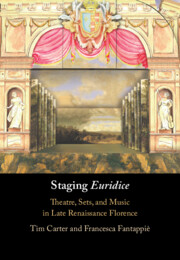Book contents
- Staging Euridice
- Staging Euridice
- Copyright page
- Contents
- Illustrations
- Tables
- Preface
- Sources, Transcriptions, and Translations
- Money, Accounts, Measurements, Dates, and Time
- Abbreviations
- 1 Euridice in Context
- 2 Staging and Sets
- 3 Euridice in Performance
- 4 Conclusions and Consequences
- Appendix I: Documents
- Works Cited
- Index
3 - Euridice in Performance
Published online by Cambridge University Press: 11 November 2021
- Staging Euridice
- Staging Euridice
- Copyright page
- Contents
- Illustrations
- Tables
- Preface
- Sources, Transcriptions, and Translations
- Money, Accounts, Measurements, Dates, and Time
- Abbreviations
- 1 Euridice in Context
- 2 Staging and Sets
- 3 Euridice in Performance
- 4 Conclusions and Consequences
- Appendix I: Documents
- Works Cited
- Index
Summary
Euridice had a poetic text by Ottavio Rinuccini, and music by Jacopo Peri and Giulio Caccini; its performers included Florentine singers plus others from Mantua and Rome; and its sponsor, Jacopo Corsi, was one of the four instrumentalists who provided the accompaniment. Although it is the “first” opera to have survived complete, it has tended to be treated as an academic exercise, and as a mere forerunner of the seemingly more successful early operas by the likes of Claudio Monteverdi. But having reconstructed the stage, it is now possible to read Euridice in a much more practical light, as something of and for the theatre. Both the text and the music make much more sense in these pragmatic terms, especially given the hitherto unrecognized revisions made to the libretto as decisions needed to be made during the rehearsals leading up to the premiere. Matters of casting, stage movement, costumes, and gesture all come into play, often cued by explicit or implicit directions in the surviving sources. This also offers a more careful way of reading poetic librettos and musical scores that are too often viewed in the abstract without grasping their performative functions.
Keywords
- Type
- Chapter
- Information
- Staging 'Euridice'Theatre, Sets, and Music in Late Renaissance Florence, pp. 130 - 197Publisher: Cambridge University PressPrint publication year: 2021



